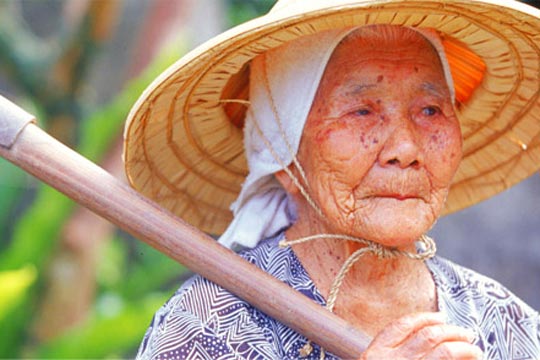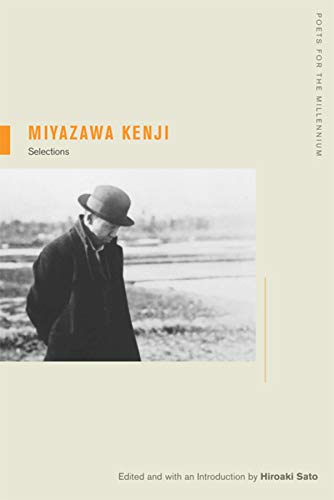NOVEMBER 3RD
By Miyazawa Kenji
Translated by M A K O T O U E D A
neither yielding to rain
nor yielding to wind
yielding neither to
snow nor to summer heat
with a stout body
like that
without greed
never getting angry
always smiling quietly
eating one and a half pints of brown rice
and bean paste and a bit of
vegetables a day
in everything
not taking oneself
into account
looking listening understanding well
and not forgetting
living in the shadow of pine trees in a Weld
in a small
hut thatched with miscanthus
if in the east there’s a
sick child
going and nursing
him
if in the west there’s a tired mother
going and carrying
for her
bundles of rice
if in the south
there’s someone
dying
going
and saying
you don’t have to be
afraid
if in the north
there’s a quarrel
or a lawsuit
saying it’s not worth it
stop it
in a drought
shedding tears
in a cold summer
pacing back and forth lost
called
a good-for-nothing
by everyone
neither praised
nor thought a pain
someone
like that
is what I want
to be
(1931)
The Japanese poet Miyazawa Kenji, who died in 1933 at the age of thirty-seven, became a culture hero on the strength of a single brief poem written toward the end of his obscure and voluntarily impoverished life. “November 3rd”—an unpublished notebook entry probably intended more as a prayer than a poem—sketches a portrait of an idealized ascetic.
“November 3rd” remains universally familiar in a way that no poem has in the West since Rudyard Kipling’s “If ” or Joyce Kilmer’s “Trees.” The world it evokes, a world of thatched huts and drought-stricken Welds, sickly children and rice farmers with bent backs, might appear anachronistic when set against the Japan of computer graphics and advanced robot technology—unless you were to take a bus into the mountains and see landscapes and faces lifted intact from a Miyazawa poem.
In his own way Miyazawa came quite close to realizing the saintly ideal set forth in “November 3rd.” The son of a pawnbroker in northern Japan’s Iwate Prefecture (a backward region affected with chronic crop failures), he converted in adolescence to the Nichiren sect of Buddhism. Taking as his guide the Lotus Sutra, which teaches the availability of Buddhahood to all sentient beings, he dedicated himself to the welfare of the local farmers, becoming a sort of one man cultural and agricultural missionary, teaching crop rotation and soil improvement and exploring methods of food and drought prevention. In the meantime, he strictly observed vegetarianism, often subsisting on a poorer diet even than the local people were used to, and as a result he ruined his health and ultimately died of Pneumonia.

